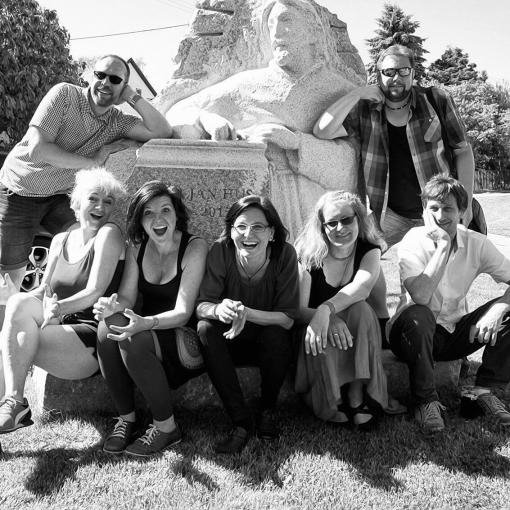If a band releases a new album after ten years and calls it Dej si čas [Take Your Time], it sounds like a pleasant self-irony. But what is ten years against delays of other bands, whose fans had to wait for new albums for eighteen (AG Flek) or even thirty years (Progres 2). For Mošny, it was said that the new album started to emerge a few years ago, but the group wanted to include some brand new songs, which they needed to rehearse and finish.
Mošny used to be a phenomenon of the Brno folk scene twenty years ago. At that time, they won the most prestigious national genre competitions, both Porta and Zahrada. Over the ten years that have passed since their fifth album Kdyby zítra… [If Tomorrow…] (2009), the music scene has changed more than the band itself. Not only did the popular Prague CD shop U Náčelníka, which sponsored the last album as a publisher, disappeared a long time ago. Also for many years there has not existed the second largest folk festival Zahrada and there is no longer the Folk & country magazine either, in which the author of this article wrote a review of the previous Mošny's album. Acoustic or vocal folk also has a different position today than it did ten or even twenty or thirty years ago. Today's times are inclined to super-genre experiments, fusions of folk with electronics, style crossovers. And even Spirituál kvintet, our oldest folk band, which Mošny could use as a role model all along, is heading towards its very last concerts and closing its activity.
After ten years, Brno's Mošny come to such times, not with an unchanged style, but even with a return to their "old times". While on the previous album Kdyby zítra… the band more than ever experimented with keyboards and a more pop sound, this time it is returning with a purely acoustic record on which the only keyboard instruments are accordion and melodeon in the hands of bandmaster Jiří Mrázek. With the exception of the sensitive drums of Petr Hladík, the band also performed without guests (the flutist Petra Kališová Václavíková, who had long been a regular guest on the roster of musicians, has long since become a full member of the band). The group's assets remain five distinctive solo voices – two male voices (high Mrázek's and deep David Gregor's) and three female voices (Alena Milichovská, Kateřina Svobodová and Kamila Šebestová have been members of the group since the very beginning in 1992).
The author of the original repertoire remains the proven Ivo Cicvárek, with whom Mošny has also been cooperating since the 1990s. Among the authors of the texts are, besides Cicvárek, also the well-proven Petr Sedláček, Daniela Weber and newly also Lada Šimíčková. This time none of the band members came up with any author's idea (in the past Alena Milichovská tried to write lyrics). The tradition of modified spirituals is followed by Mošny in a well-mastered classic Wayfaring Stranger (in Czech as Nadosah – with contrasting voices of the two singers). A brave but not uninteresting novelty is the á cappella version of Morituri te salutant by Karel Kryl, in which only the first-plan imitation of marching steps is slightly disturbing.
The position of the group Mošny on the current scene is illustrated by photos in the middle of the nice booklet of the album. Seven friends are sitting over coffee, still being excited by having the opportunity to be together after years. The time when they were intensively touring festivals, winning competitions and recording their albums in three-year intervals, is over. Nowadays they have their families, jobs and other interests, but music has remained an important hobby for them. And the album they bring to their fans after so many years is actually very good in its genre. The return to acoustic sound and some uncomplicatedness paid off, the lyrics were written by experienced authors, and Mošny learned to build vocals over the years as well. Although Mošny in fact does not come up with anything fundamentally new, songs such as Vestoje, Africký večírek, Námořnice, Tichý hlas [Standing, African Party, Sailor, Silent Voice] of the exquisite Johanka by Petr Sedláček (who is the author of both lyrics and music) are worth listening. Years ago, they would certainly be festival hits. And it is the concentration of strong themes and well-crafted songs with an emphasis on vocals and acoustic sound that makes the new Dej si čas one of the best albums that Mošny has made over the years of its existence.
Mošny – Dej si čas; Self-published in 2019, distributed by Indies Scope. 13 tracks, total time: 40:36
































No comment added yet..